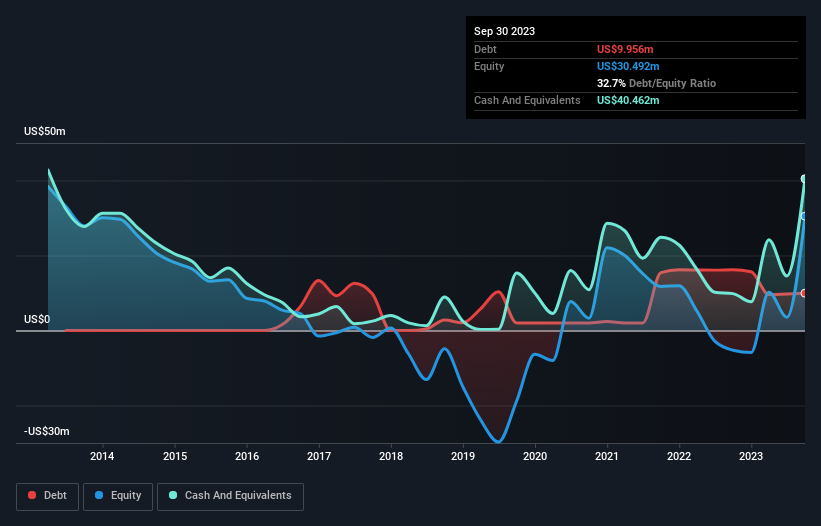- United States
- /
- Medical Equipment
- /
- NasdaqCM:DCTH
Is Delcath Systems (NASDAQ:DCTH) Using Debt In A Risky Way?
David Iben put it well when he said, 'Volatility is not a risk we care about. What we care about is avoiding the permanent loss of capital.' So it might be obvious that you need to consider debt, when you think about how risky any given stock is, because too much debt can sink a company. Importantly, Delcath Systems, Inc. (NASDAQ:DCTH) does carry debt. But the real question is whether this debt is making the company risky.
When Is Debt Dangerous?
Debt is a tool to help businesses grow, but if a business is incapable of paying off its lenders, then it exists at their mercy. If things get really bad, the lenders can take control of the business. However, a more common (but still painful) scenario is that it has to raise new equity capital at a low price, thus permanently diluting shareholders. Of course, the upside of debt is that it often represents cheap capital, especially when it replaces dilution in a company with the ability to reinvest at high rates of return. The first thing to do when considering how much debt a business uses is to look at its cash and debt together.
Check out our latest analysis for Delcath Systems
What Is Delcath Systems's Net Debt?
You can click the graphic below for the historical numbers, but it shows that Delcath Systems had US$9.96m of debt in September 2023, down from US$16.2m, one year before. However, it does have US$40.5m in cash offsetting this, leading to net cash of US$30.5m.

A Look At Delcath Systems' Liabilities
The latest balance sheet data shows that Delcath Systems had liabilities of US$14.0m due within a year, and liabilities of US$3.11m falling due after that. Offsetting this, it had US$40.5m in cash and US$205.0k in receivables that were due within 12 months. So it actually has US$23.6m more liquid assets than total liabilities.
This surplus suggests that Delcath Systems is using debt in a way that is appears to be both safe and conservative. Given it has easily adequate short term liquidity, we don't think it will have any issues with its lenders. Succinctly put, Delcath Systems boasts net cash, so it's fair to say it does not have a heavy debt load! When analysing debt levels, the balance sheet is the obvious place to start. But ultimately the future profitability of the business will decide if Delcath Systems can strengthen its balance sheet over time. So if you want to see what the professionals think, you might find this free report on analyst profit forecasts to be interesting.
Over 12 months, Delcath Systems made a loss at the EBIT level, and saw its revenue drop to US$2.2m, which is a fall of 48%. That makes us nervous, to say the least.
So How Risky Is Delcath Systems?
We have no doubt that loss making companies are, in general, riskier than profitable ones. And in the last year Delcath Systems had an earnings before interest and tax (EBIT) loss, truth be told. Indeed, in that time it burnt through US$30m of cash and made a loss of US$45m. But at least it has US$30.5m on the balance sheet to spend on growth, near-term. Overall, its balance sheet doesn't seem overly risky, at the moment, but we're always cautious until we see the positive free cash flow. There's no doubt that we learn most about debt from the balance sheet. However, not all investment risk resides within the balance sheet - far from it. Be aware that Delcath Systems is showing 4 warning signs in our investment analysis , and 1 of those makes us a bit uncomfortable...
At the end of the day, it's often better to focus on companies that are free from net debt. You can access our special list of such companies (all with a track record of profit growth). It's free.
New: Manage All Your Stock Portfolios in One Place
We've created the ultimate portfolio companion for stock investors, and it's free.
• Connect an unlimited number of Portfolios and see your total in one currency
• Be alerted to new Warning Signs or Risks via email or mobile
• Track the Fair Value of your stocks
Have feedback on this article? Concerned about the content? Get in touch with us directly. Alternatively, email editorial-team (at) simplywallst.com.
This article by Simply Wall St is general in nature. We provide commentary based on historical data and analyst forecasts only using an unbiased methodology and our articles are not intended to be financial advice. It does not constitute a recommendation to buy or sell any stock, and does not take account of your objectives, or your financial situation. We aim to bring you long-term focused analysis driven by fundamental data. Note that our analysis may not factor in the latest price-sensitive company announcements or qualitative material. Simply Wall St has no position in any stocks mentioned.
About NasdaqCM:DCTH
Delcath Systems
An interventional oncology company, focuses on the treatment of primary and metastatic liver cancers in the United States and Europe.
Flawless balance sheet and undervalued.
Similar Companies
Market Insights
Community Narratives



